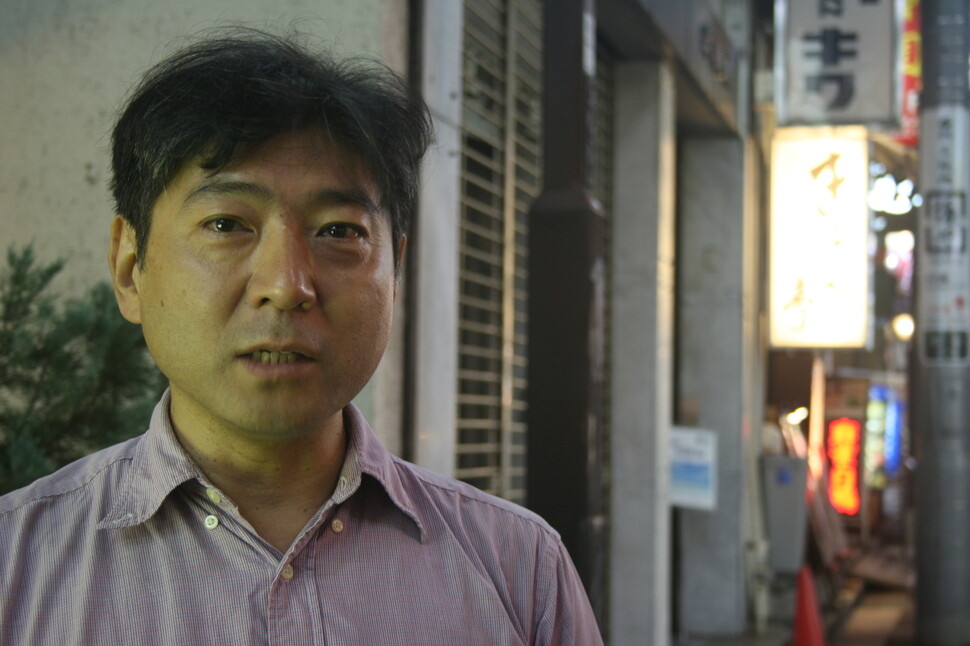hankyoreh
Links to other country sites 다른 나라 사이트 링크
[Interview] New book debunks the Japanese right wing’s denial of Korean massacres after the Great Kanto Earthquake

“Even Shintaro Ishihara, the [right-wing] former governor of Tokyo, wouldn’t have thought to deny the massacre of Koreans during the Great Kanto Earthquake. Until the 1990s, at least, there was no one, even on the right, who tried to deny those massacres,” said Japanese nonfiction writer Naoki Kato.
Kato received quite a bit of attention, even in South Korea, for his book “September on the Streets of Tokyo: Echoes of the Massacres during the Great Kanto Earthquake of 1923.” Now the author is out with a new book, called “Trick,” which refutes claims that Koreans were rioting during the earthquake and that no massacres occurred.
During the days after the earthquake, which struck Japan on Sept. 1, 1923, rumors spread that Koreans were rioting and poisoning wells, prompting groups of ordinary Japanese to join vigilante bands that went around slaughtering Korean and Chinese workers. Some members of the military also took part in those massacres, in which thousands of Koreans are estimated to have been killed.
Just a decade ago, Kato would’ve had no reason to write this kind of book. “Historical revisionism started going mainstream in Japan in the 1990s, which got people thinking that it was okay to act as if Japan didn’t have a dark past. That didn’t really make any sense, but it was loudly promoted, and people started listening,” Kato related sadly during his interview with the Hankyoreh in Tokyo on Aug. 23.
Before publishing “Trick,” Kato was already running a website dedicated to debunking denials of Korean massacres during the Great Kanto Earthquake. “Books have a certain power. I didn’t think my website was enough,” he explained.
Massacre denialism is having an impact on everyday politics. For the past three years, Tokyo Governor Yuriko Koike has refused to send a eulogy to a memorial service held at Yokoamicho Park in Tokyo’s Sumida Ward for Koreans who were killed in the massacres. Koike has expressed her condolences for “all the people who sadly died in the major disaster that occurred in Tokyo and various subsequent incidents,” but is unwilling to send a separate eulogy dedicated to Koreans.
“The reference to people dying in ‘various subsequent events’ can only refer to those who were massacred. But Koike won’t even say that they were ‘killed.’ That appears to indicate that she either believes in massacre denialism or thinks it’s a [credible] theory,” Kato said.
There’s nothing sophisticated about the “tricks” used in massacre denialism that Kato mentions in his book. These tricks include quoting Japanese newspapers that uncritically printed baseless rumors about Korean riots, citing only the first part of personal accounts that mention the rumors of riots but then go on to say that those rumors were false, and cobbling together imprecise figures to argue that the majority of Korean fatalities can be attributed to the earthquake itself.
Kato said he began researching the massacres of Koreans after Ishihara, the former Tokyo governor, derogatively referred to Koreans as “third-country nationals” in 2000. Ishihara said that “crime in Tokyo is getting worse, and it’s entirely the fault of third-country nationals,” a slur that refers to Koreans and Taiwanese living in Japan. The former governor also said that “foreigners who have entered the country illegally might cause social unrest,” while mentioning the massacres of Koreans after the Great Kanto Earthquake.
“That’s when I found myself thinking that the massacres of Koreans aren’t just an old episode from the past,” Kato said. “Even Ishihara couldn’t find a reason not to send a eulogy.”
“When a disaster occurs, there will always be some people who try to brand minorities as criminals, regardless of the country. The important thing is whether the government and society are capable of suppressing such urges,” the author said.
By Cho Ki-weon, Tokyo correspondent
Please direct comments or questions to [english@hani.co.kr]

Editorial・opinion
![[Column] Season 2 of special prosecutor probe may be coming to Korea soon [Column] Season 2 of special prosecutor probe may be coming to Korea soon](https://flexible.img.hani.co.kr/flexible/normal/500/300/imgdb/original/2024/0426/3317141030699447.jpg) [Column] Season 2 of special prosecutor probe may be coming to Korea soon
[Column] Season 2 of special prosecutor probe may be coming to Korea soon![[Column] Park Geun-hye déjà vu in Yoon Suk-yeol [Column] Park Geun-hye déjà vu in Yoon Suk-yeol](https://flexible.img.hani.co.kr/flexible/normal/500/300/imgdb/original/2024/0424/651713945113788.jpg) [Column] Park Geun-hye déjà vu in Yoon Suk-yeol
[Column] Park Geun-hye déjà vu in Yoon Suk-yeol- [Editorial] New weight of N. Korea’s nuclear threats makes dialogue all the more urgent
- [Guest essay] The real reason Korea’s new right wants to dub Rhee a founding father
- [Column] ‘Choson’: Is it time we start referring to N. Korea in its own terms?
- [Editorial] Japan’s rewriting of history with Korea has gone too far
- [Column] The president’s questionable capacity for dialogue
- [Column] Are chaebol firms just pizza pies for families to divvy up as they please?
- [Column] Has Korea, too, crossed the Rubicon on China?
- [Correspondent’s column] In Japan’s alliance with US, echoes of its past alliances with UK
Most viewed articles
- 1‘We must say no’: Seoul defense chief on Korean, USFK involvement in hypothetical Taiwan crisis
- 2After election rout, Yoon’s left with 3 choices for dealing with the opposition
- 3AI is catching up with humans at a ‘shocking’ rate
- 4[Editorial] Korea’s surprise Q1 growth requires objective assessment, not blind fanfare
- 5Noting shared ‘values,’ Korea hints at passport-free travel with Japan
- 6Why Kim Jong-un is scrapping the term ‘Day of the Sun’ and toning down fanfare for predecessors
- 7Two factors that’ll decide if Korea’s economy keeps on its upward trend
- 8Amnesty notes ‘erosion’ of freedom of expression in Korea in annual human rights report
- 9The dream K-drama boyfriend stealing hearts and screens in Japan
- 10Yoon says collective action by doctors ‘shakes foundations of liberty and rule of law’